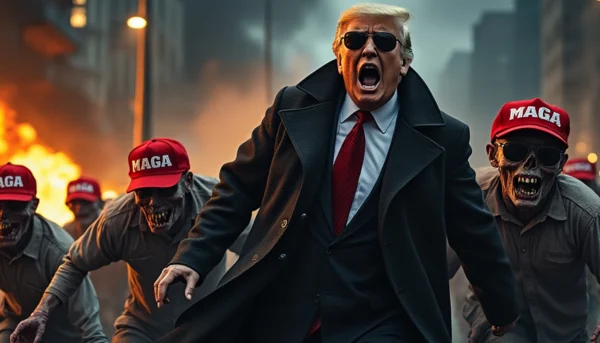 She leans in, voice dripping with the kind of sarcasm that could cut through steel:
She leans in, voice dripping with the kind of sarcasm that could cut through steel:
Good evening, America. Rachel Maddow here, and tonight we’re diving into a comparison that’s as bizarre as it is enlightening. We’re talking about Albert Wesker from the “Resident Evil” series and our very own former President, Donald Trump. Now, you might be thinking, “Rachel, have you finally lost it? Comparing a video game villain to a real-life politician?” Well, stick with me, because the parallels are as uncanny as they are unsettling.
Now, before you dismiss this as some far-fetched analogy, let me assure you that we’re not just grasping at straws here. We’re diving deep into the psyche of both a fictional villain and a real-life political figure to expose the eerie similarities. So, grab your popcorn, because this is going to be a wild ride.
Manipulation of Truth
Let’s start with the most obvious trait they share: manipulation of truth. Albert Wesker, the poster boy for corporate evil, was a master at spinning tales. He’d tell you the sky was green if it served his twisted agenda. Whether he was misleading his allies, his enemies, or anyone in between, Wesker knew that controlling the narrative was key to controlling the game.
Sound familiar? It should. Trump’s playbook was filled with similar entries. Remember the whole “birther” movement? That wasn’t just a political strategy; it was a full-blown campaign of misinformation. Or how about the election fraud claims that, despite being debunked multiple times, still linger in the minds of millions? Both men twisted facts like pretzels, all to keep their grip on power.
But it doesn’t stop there. Wesker’s lies were often about more than just words; they were about altering reality itself. He manipulated viruses, people, entire ecosystems to fit his vision of the world. Trump, on the other hand, didn’t need a bioweapon to distort reality—he had social media. With a single tweet, he could set the nation on fire, fueling division and distrust. Both men understood the power of perception, and they wielded it like a weapon.
Quest for Power
Let’s talk about ambition, shall we? Wesker wanted to rule the world—literally. He was all about that bioweapon life, aiming to create a new world order with him at the top. His quest for power was relentless, and he was willing to sacrifice anything and anyone to achieve it.
Trump? He might not have been after global domination in the traditional sense, but his actions suggest a man who was intoxicated by power. His refusal to accept the 2020 election results wasn’t just a political maneuver; it was a desperate attempt to cling to the presidency at all costs. And let’s not forget his role in the January 6th insurrection—an event that will go down in history as a dark chapter in American democracy. That’s a man who’d rather burn the house down than move out.
Both Wesker and Trump saw themselves as the rightful rulers of their respective domains. Wesker envisioned a world remade in his image, with himself as the godlike figure at the center. Trump, too, cultivated a personality cult that placed him at the center of a new political order—one where loyalty to him was the ultimate litmus test. In their minds, the world was theirs for the taking, and anyone who stood in their way was an enemy to be crushed.
Disregard for Human Life
Now, this one is where things get really dark. Wesker’s experiments? They turned people into zombies. Literally. He viewed human life as nothing more than a tool to be used in his quest for power. If that meant unleashing a virus that wiped out entire populations, so be it. The ends always justified the means for Wesker.
Trump might not have been concocting viruses in a lab, but his handling of the COVID-19 crisis turned America into a zombie movie of its own. His downplaying of the virus, his dismissal of scientific advice, and his promotion of unproven treatments—these actions cost lives. Thousands of them. Both men showed a chilling disregard for human life, all in the name of their own twisted visions.
But it goes beyond just the pandemic. Wesker’s lack of empathy was a hallmark of his character, and Trump displayed a similar trait throughout his presidency. Whether it was the families separated at the border, the lives lost to police violence, or the communities devastated by natural disasters, Trump’s response was often one of indifference—or worse, outright hostility. Like Wesker, he seemed more interested in maintaining his power than in protecting the lives of those he was supposed to serve.
Creating a Cult of Personality
Wesker had his followers, people who’d follow him to the ends of the earth or until they turned into a zombie, whichever came first. His charisma, his intelligence, his sheer force of will made him a leader that people—and monsters—were willing to die for. He didn’t just command loyalty; he demanded it.
Trump? He’s got his MAGA base, loyal to a fault, believing in his vision no matter how many times reality checks in. From rallies that felt more like religious revivals to a social media presence that kept his supporters on the edge of their seats, Trump cultivated a following that was, and still is, unwavering in its devotion. Like Wesker, Trump’s appeal wasn’t just about policy; it was about personality. It was about creating a brand so strong that it could survive anything—even an insurrection.
Both Wesker and Trump understood that true power doesn’t just come from the top down; it comes from the bottom up. It comes from building a base of followers who will do anything for their leader, no questions asked. And both men were masters at this dark art.
The End Justifies the Means
For Wesker, any atrocity was justified if it got him closer to his goal. Whether it was betraying his allies, unleashing a deadly virus, or manipulating entire nations, Wesker’s moral compass was always pointing in the direction of his own ambition.
Trump’s post-election antics? Pressuring state officials, promoting conspiracy theories, inciting a violent insurrection—all to cling to power. Both men believed that their ends justified any means, no matter how unethical or illegal. The difference? Wesker did it in a fictional world, while Trump did it in the real one, with real consequences.
Wesker’s ruthlessness made him one of the most feared villains in video game history. Trump’s actions, on the other hand, have left a scar on the American political landscape that may never fully heal. But in both cases, the message was clear: when you’re playing for power, there are no rules. There is only victory or defeat, and both men were willing to do whatever it took to win.
A Legacy of Division
Wesker’s legacy? A world in ruins, divided and destroyed by his ambition. His actions left a trail of destruction that could never be undone. Trump’s legacy? A nation more polarized than a magnet in a blender. Both left behind a legacy not of unity, but of chaos and division.
Wesker’s world was one where trust was shattered, where communities were torn apart, and where hope was a rare commodity. Trump’s America? Not so different. His presidency exacerbated divisions that had been simmering for years, turning neighbors into enemies and friends into foes. Both men thrived on division, knowing that a divided people are easier to control.
But perhaps the most chilling similarity between Wesker and Trump is the way their legacies continue to haunt the world long after they’ve left the stage. Wesker’s influence can still be felt in the “Resident Evil” series, as new villains rise to take his place. Trump’s influence? It’s alive and well in the current political climate, as his followers continue to push his agenda and his rhetoric. Both men may be gone, but their shadows loom large.
So, why this comparison? Because sometimes, fiction holds a mirror up to reality. Albert Wesker might be a character, but the traits he embodies—manipulation, power hunger, disregard for life—are all too real in figures like Trump. They remind us that the line between hero and villain, between democracy and dictatorship, is thinner than we might like to believe.
In the end, whether it’s in a video game or in the White House, the lesson is clear: unchecked ambition and deceit can lead to ruin. And that, my friends, is not just a plot twist in a game; it’s a warning for our times.
Rachel leans back, with a smirk:
And that’s your nightly dose of reality, with a side of “Resident Evil.” Goodnight, America. Stay safe, and remember, not all monsters are fictional.









